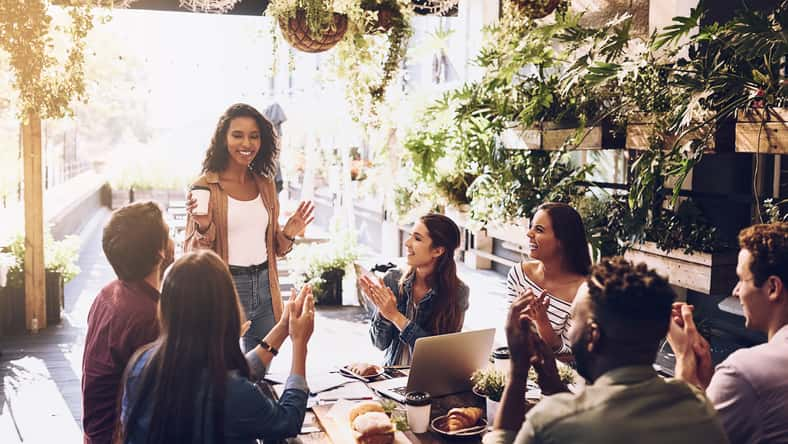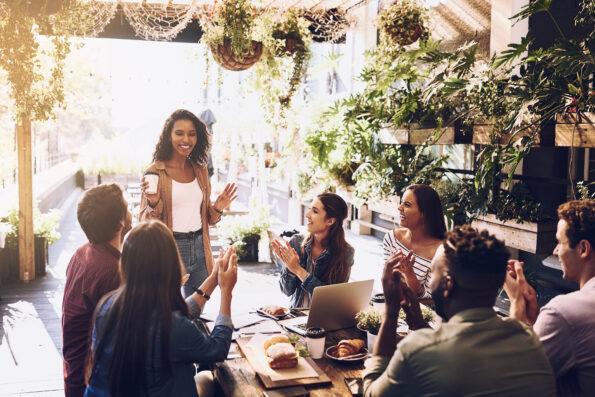Do Audiences Clap Because Of Approval Or Social Pressures? Researchers Dug Into The Science Behind Applause

Have you ever attended a play or musical and felt prompted to join in with the crowd’s applause after an act ended?
The practice of clapping as a sign of approval has been around since ancient times. In fact, the custom is even cited in the Old Testament.
While applauding is commonplace for most entertainment events, though, have you ever wondered how a group of strangers actually begin applauding? Moreover, what factors determine how many people join in on the clapping, and just how long will the show of approval last?
These questions, although common, are not very easy to answer– especially because the phenomenon has not been extensively studied.
Still, in a scientific paper published in 2003, one theory holds that a few individuals who have lower thresholds of embarrassment actually trigger applause that ripples throughout the rest of the audience.
In other words, once these individuals start to clap, it helps decrease the embarrassment felt by other attendees– who eventually join in with the applause.
“Whatever one’s threshold is, their ’embarrassment’ is reduced as others around them start clapping,” said Gary Lupyan, the study’s co-author.
But interestingly, the researchers determined whether or not the other audience members also clapped actually had nothing to do with the “impressiveness” of a performance.
Instead, it was found that the length of time an audience kept clapping did correlate to an audience’s approval of a performance.

R Jordaan/peopleimages.com – stock.adobe.com – illustrative purposes only, not the actual people
Then, once the effort required for clapping began to exceed some attendees’ enthusiasm levels, they would stop clapping– which ultimately raised the embarrassment of other guests and caused them to stop clapping, too.
And while many performers are often more nervous to go on stage in front of a large crowd, the study found that larger audiences are more likely to clap more predictably as opposed to smaller ones.
“Imagine that five percent of people applaud at everything. A smaller audience has a larger probability of not having any such person. That would be a tough crowd,” Lupyan explained.
“As an audience grows larger, the probability converges to five percent. In other words, two larger audiences are more likely to behave more similarly to one another than two small audiences, for the same reason that if you flip a coin 100 times, you’re more likely to get closer to half heads and half tails than if you flip a coin 10 times.”
However, a more recent study published in 2013 came to a converse conclusion.
Led by mathematician Richard P. Mann of the University of Leeds, the study filmed groups of between 13 and 20 college students as they watched oral presentations. Then, the team concluded that there was relatively little correlation between the duration of applause and how much the students enjoyed what they watched.
Rather, the researchers found that applause was more of a “social contagion” that began with a single audience member who started clapping about 2.1 seconds after the presenter stopped speaking. Afterward, the applause spread very quickly throughout the audience groups for about 2.93 seconds.
Finally, by the 5.56 seconds mark, the first individual who clapped tended to stop applauding. Then, approximately 2.6 seconds later, the rest of the group finished clapping, too.
Another interesting discovery made within this study revealed that applause was not triggered by the physical proximity of other audience members to the first individual who started clapping. Rather, Mann detailed how it was actually the loudness of claps that prompted other viewers to start applauding, too.
“As soon as people can hear that other people in the audience are clapping, they begin to clap themselves,” Mann said.
“So often you are feeling social pressure from audience members you couldn’t directly see.”
To read this study’s complete findings, which have been published in the Journal of the Royal Society, visit the link here.
If true crime defines your free time, this is for you: join Chip Chick’s True Crime Tribe
Bring The Vibes Of A Tropical Paradise Into Your Home Or Outdoor Garden With These Exotic Plants
She’s Refusing To Let Her Sister Pass Down Her American Girl Dolls To Her Niece
Sign up for Chip Chick’s newsletter and get stories like this delivered to your inbox.
More About:Science





